初中英语外研版七下Module 11 Body language Unit 3 Language in use课件(共19张PPT)
文档属性
| 名称 | 初中英语外研版七下Module 11 Body language Unit 3 Language in use课件(共19张PPT) |

|
|
| 格式 | pptx | ||
| 文件大小 | 320.5KB | ||
| 资源类型 | 教案 | ||
| 版本资源 | 外研版 | ||
| 科目 | 英语 | ||
| 更新时间 | 2023-08-30 00:00:00 | ||
图片预览

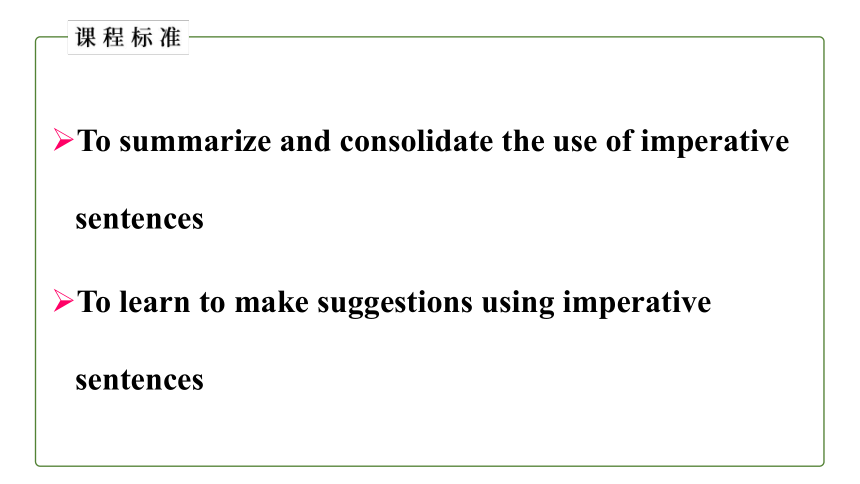
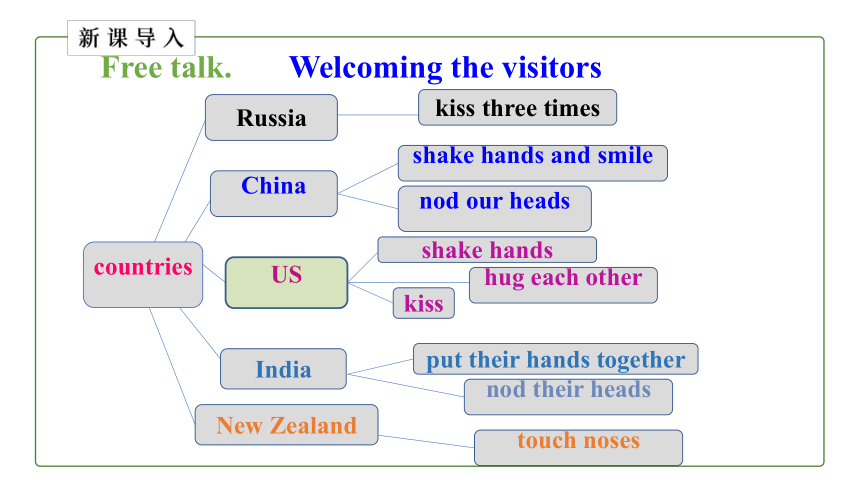
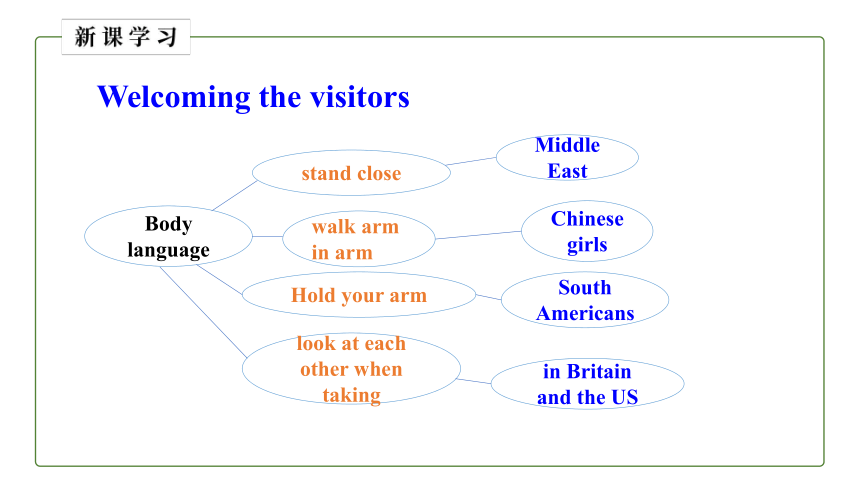
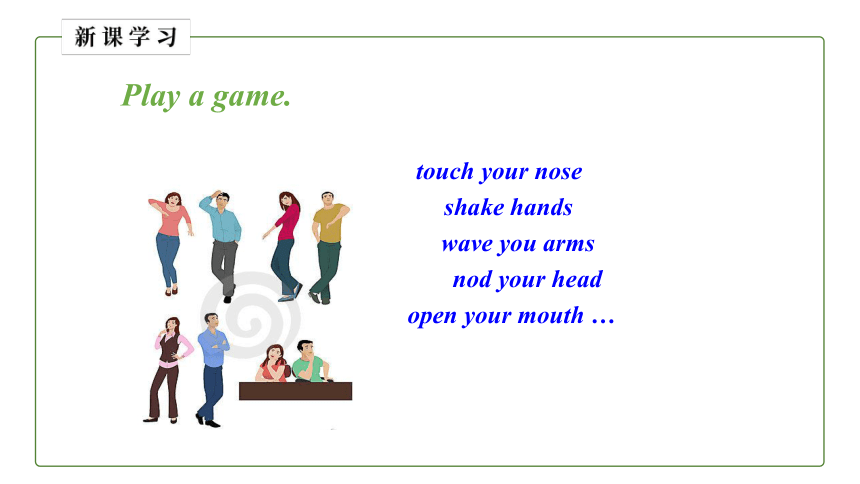
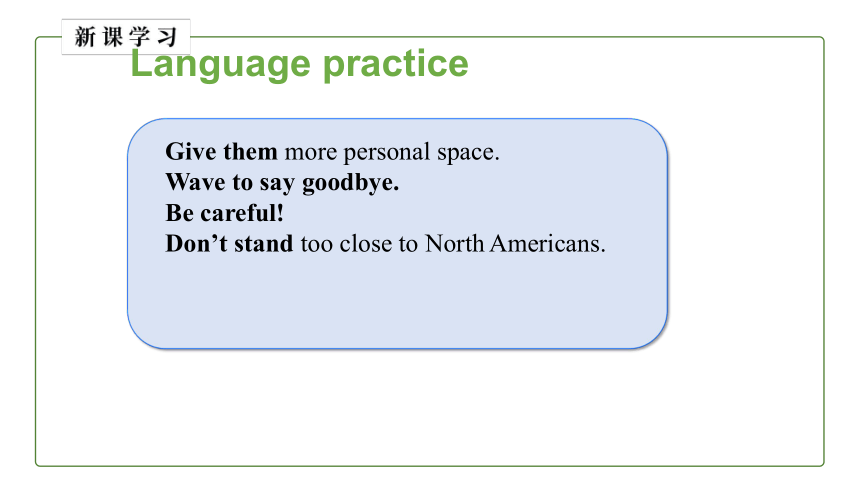
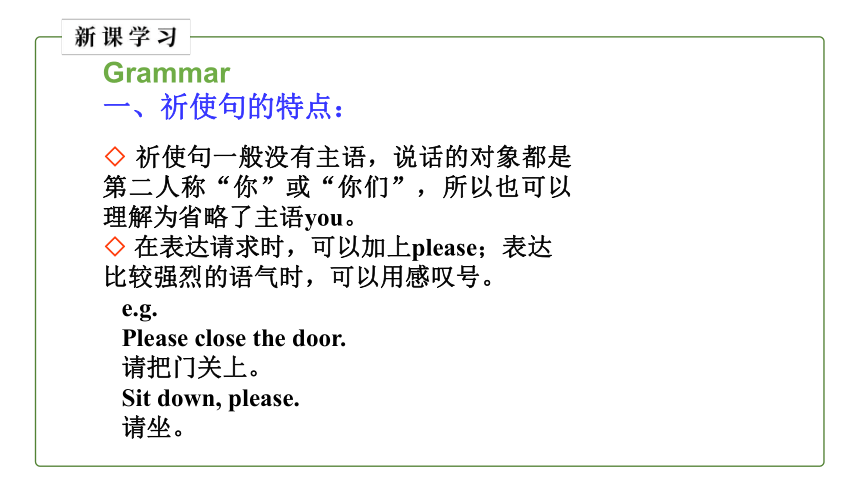
文档简介
(共19张PPT)
Module 11 Body language
Unit 3 Language in use
To summarize and consolidate the use of imperative sentences
To learn to make suggestions using imperative sentences
US
India
nod our heads
kiss three times
shake hands
shake hands and smile
hug each other
Russia
countries
kiss
China
Free talk. Welcoming the visitors
New Zealand
put their hands together
nod their heads
touch noses
in Britain and the US
South Americans
walk arm in arm
Hold your arm
Chinese girls
Middle East
look at each other when taking
Body language
stand close
Welcoming the visitors
Play a game.
touch your nose
shake hands
wave you arms
nod your head
open your mouth …
Language practice
Give them more personal space.
Wave to say goodbye.
Be careful!
Don’t stand too close to North Americans.
Grammar
一、祈使句的特点:
◇ 祈使句一般没有主语,说话的对象都是第二人称“你”或“你们”,所以也可以理解为省略了主语you。
◇ 在表达请求时,可以加上please;表达 比较强烈的语气时,可以用感叹号。
e.g.
Please close the door.
请把门关上。
Sit down, please.
请坐。
二、祈使句的结构:
◇ 肯定形式:
以动词原形开头,无时态和数的变化。
Stop! 停!
Hurry up! 快点!
Please don’t do it. 请不要这么做。
◇ 否定形式:
1. 祈使句的否定形式是在动词原形前加don’t。
2. No+名词或动词-ing用来表示禁止性的祈使句。
Don’t be late again. 不要再迟到了。
No smoking. 禁止吸烟!
Do’s Don’ts
Britain ◆ Stand in line. ◆ Shake hands. ◆ Say “please” and “thank you”. ◆ Open doors for others. ◆ Look at people when you talk. ◆ Be on time.
● Touch people.
● Ask a woman’s age.
● Stand too close.
● Say anything too personal.
1 work in pairs. Talk about do’s and don’ts in a foreign country.
2 Make a list of do’s and don’ts to help
visitors to Britain.
Stand in line.
Don’t touch people when you
talk to them.
…
3 Rewrite the sentences.
It’s important to listen to the teacher.
Listen to the teacher.
You cannot shout in the classroom.
Don’t shout in the classroom.
1. It’s important to be careful.
2. It’s important to clean and tidy the lab.
3. You cannot touch anything if the teacher doesn’t ask you to.
4. You cannot bring food or drink into the lab.
5. You cannot enter the lab alone.
1. It’s important to be careful.
2. It’s important to clean and tidy the lab.
3. You cannot touch anything if the teacher
doesn’t ask you to.
4. You cannot bring food or drink into the lab.
5. You cannot enter the lab alone.
Be careful.
Clean and tidy the lab.
Don’t touch anything if the teacher doesn’t ask you to.
Don’t bring food or drink into the lab.
Don’t enter the lab alone.
Answer the questions. Use the words
and expressions from the box to help you.
all right arm in arm close different
hold on to kiss three times point at
shake hands with wave
1. How do the British say hello to each other when
they first meet
2. Does body language mean the same thing in
different countries
They shake hands with each other.
No, it doesn’t.
3. How do the Russians say hello to each other
when they meet
4. Is it polite to stand close to North Americans
5. Is it all right to wave goodbye in Greece
6. How do you usually say goodbye with body
language
They usually kiss three times.
No, it isn’t.
No, it isn’t.
I wave my hand.
Around the world
Read and answer.
List the way of being polite in Japan.
People bow to say “thank you”, “sorry”, “hello”, “goodbye”, “you’re welcome”, “excuse me” and many other things.
用括号内所给动词的适当形式填空。
1. It’s an important meeting. _______
_____ (not, be) late.
2. ______ ______ (not, make) any noise!
Your mother is sleeping.
3. ______ ______ (not, speak) with your mouth full of food and ______ (be) polite.
Don’t
be
Don’t
make
Don’t
speak
be
4. ______ (give) us ten years and just
see what our country will be like.
5. __________ (not, let) the baby cry.
6. Wear more clothes or you _____
______ (catch) a cold.
7. No _________. (park)
Give
Don’t let
will
catch
parking
I remembered these words.
2. I learned about different culture in different countries.
3. I can use the imperative sentences.
1. Write a passage about different ways of saying hello in China. (必做)
2. Make a poster about body language.
(选做)
Module 11 Body language
Unit 3 Language in use
To summarize and consolidate the use of imperative sentences
To learn to make suggestions using imperative sentences
US
India
nod our heads
kiss three times
shake hands
shake hands and smile
hug each other
Russia
countries
kiss
China
Free talk. Welcoming the visitors
New Zealand
put their hands together
nod their heads
touch noses
in Britain and the US
South Americans
walk arm in arm
Hold your arm
Chinese girls
Middle East
look at each other when taking
Body language
stand close
Welcoming the visitors
Play a game.
touch your nose
shake hands
wave you arms
nod your head
open your mouth …
Language practice
Give them more personal space.
Wave to say goodbye.
Be careful!
Don’t stand too close to North Americans.
Grammar
一、祈使句的特点:
◇ 祈使句一般没有主语,说话的对象都是第二人称“你”或“你们”,所以也可以理解为省略了主语you。
◇ 在表达请求时,可以加上please;表达 比较强烈的语气时,可以用感叹号。
e.g.
Please close the door.
请把门关上。
Sit down, please.
请坐。
二、祈使句的结构:
◇ 肯定形式:
以动词原形开头,无时态和数的变化。
Stop! 停!
Hurry up! 快点!
Please don’t do it. 请不要这么做。
◇ 否定形式:
1. 祈使句的否定形式是在动词原形前加don’t。
2. No+名词或动词-ing用来表示禁止性的祈使句。
Don’t be late again. 不要再迟到了。
No smoking. 禁止吸烟!
Do’s Don’ts
Britain ◆ Stand in line. ◆ Shake hands. ◆ Say “please” and “thank you”. ◆ Open doors for others. ◆ Look at people when you talk. ◆ Be on time.
● Touch people.
● Ask a woman’s age.
● Stand too close.
● Say anything too personal.
1 work in pairs. Talk about do’s and don’ts in a foreign country.
2 Make a list of do’s and don’ts to help
visitors to Britain.
Stand in line.
Don’t touch people when you
talk to them.
…
3 Rewrite the sentences.
It’s important to listen to the teacher.
Listen to the teacher.
You cannot shout in the classroom.
Don’t shout in the classroom.
1. It’s important to be careful.
2. It’s important to clean and tidy the lab.
3. You cannot touch anything if the teacher doesn’t ask you to.
4. You cannot bring food or drink into the lab.
5. You cannot enter the lab alone.
1. It’s important to be careful.
2. It’s important to clean and tidy the lab.
3. You cannot touch anything if the teacher
doesn’t ask you to.
4. You cannot bring food or drink into the lab.
5. You cannot enter the lab alone.
Be careful.
Clean and tidy the lab.
Don’t touch anything if the teacher doesn’t ask you to.
Don’t bring food or drink into the lab.
Don’t enter the lab alone.
Answer the questions. Use the words
and expressions from the box to help you.
all right arm in arm close different
hold on to kiss three times point at
shake hands with wave
1. How do the British say hello to each other when
they first meet
2. Does body language mean the same thing in
different countries
They shake hands with each other.
No, it doesn’t.
3. How do the Russians say hello to each other
when they meet
4. Is it polite to stand close to North Americans
5. Is it all right to wave goodbye in Greece
6. How do you usually say goodbye with body
language
They usually kiss three times.
No, it isn’t.
No, it isn’t.
I wave my hand.
Around the world
Read and answer.
List the way of being polite in Japan.
People bow to say “thank you”, “sorry”, “hello”, “goodbye”, “you’re welcome”, “excuse me” and many other things.
用括号内所给动词的适当形式填空。
1. It’s an important meeting. _______
_____ (not, be) late.
2. ______ ______ (not, make) any noise!
Your mother is sleeping.
3. ______ ______ (not, speak) with your mouth full of food and ______ (be) polite.
Don’t
be
Don’t
make
Don’t
speak
be
4. ______ (give) us ten years and just
see what our country will be like.
5. __________ (not, let) the baby cry.
6. Wear more clothes or you _____
______ (catch) a cold.
7. No _________. (park)
Give
Don’t let
will
catch
parking
I remembered these words.
2. I learned about different culture in different countries.
3. I can use the imperative sentences.
1. Write a passage about different ways of saying hello in China. (必做)
2. Make a poster about body language.
(选做)
同课章节目录
- Module 1 Lost and found
- Unit 1 Whose bag is this?
- Unit 2 Are they yours?
- Unit 3 Language in use
- Module 2 What can you do ?
- Unit 1 I can play the piano
- Unit 2 I can run really fast
- Unit 3 Language in use
- Module 3 Making plans
- Unit 1 What are you going to do at the weekends?
- Unit 2 We're going to cheer the players.
- Unit 3 Language in use
- Module 4 Life in the future
- Unit 1 Everyone will study at home
- Unit 2 Every family will have a small plane.
- Unit 3 Language in use
- Module 5 Shopping
- Unit 1 What can I do for you?
- Unit 2 You can buy everything on the Internet
- Unit 3 Language in use
- Module 6 Around town
- Unit 1 Could you tell me how to get to the Nationa
- Unit 2 The London Eye is on your right.
- Unit 3 Language in use
- Revision module A
- Module 7 My past life
- Unit 1 I was born in a small village.
- Unit 2 I was born in Quincy.
- Unit 3 Language in use
- Module 8 Story time
- Unit 1 Once upon a time….
- Unit 2 Goldilocks hurried out of the house.
- Unit 3 Language in use
- Module 9 Life history
- Unit 1 He left school and began work at the age of
- Unit 2 He decided to be an actor.
- Unit 3 Language in use
- Module 10 A holiday journey
- Unit 1 What did you do?
- Unit 2 This morning we took a walk.
- Unit 3 Language in use
- Module 11 Body language
- Unit 1 They touch noses!
- Unit 2 Here are some ways to welcome them.
- Unit 3 Language in use
- Module 12 Western music
- Unit 1 It's so beautiful!
- Unit 2 Vienna is the centre of European classical
- Unit 3 Language in use
- Revision module B
